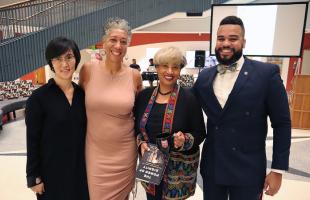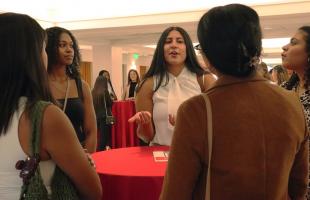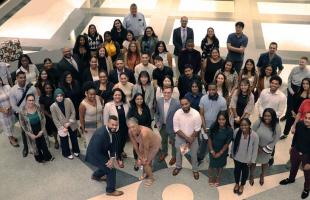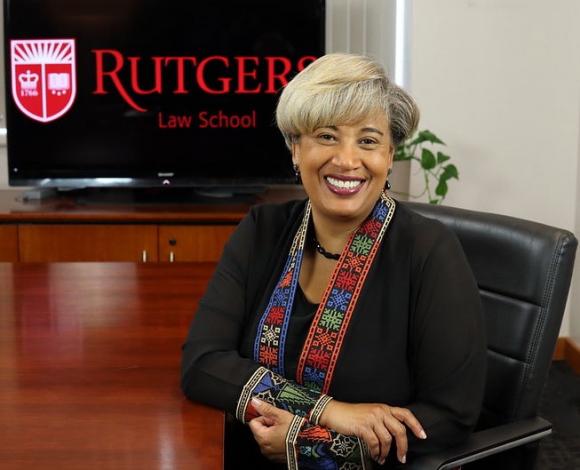
Justice Leona Theron
South African Justice Leona Theron has broken through several glass ceilings against seemingly impossible odds during her illustrious career. She rose from a low-income, segregated township in South Africa during apartheid to the Constitutional Court, the highest court in the land on constitutional matters, in 2017. Along the way, she became the youngest judge in the country appointed to the High Court of South Africa and the first Black woman appointed to the bench of the KwaZulu-Natal High Court. Justice Theron traveled to Rutgers Law School campuses in Newark and Camden before classes began in August to share her story of perseverance and determination with current and incoming law students.
“The education I received has changed my life. My education has taken me all over the world. My education has been my passport. Most importantly, it has taken me to the highest court in South Africa,” said Justice Theron. “My Fulbright scholarship to study my master’s in the United States set me on a path I would have never anticipated. I hope to encourage the students that I meet that they should make the most of their education and use it as a steppingstone to work towards the realization of human rights for all.”
Justice Theron also interviewed Newark and Camden law students for the Constitutional Court of South Africa’s foreign clerk program, in which judges appoint up to 20 young lawyers from around the world to serve as foreign law clerks. Working alongside two South African law clerks, each foreign law clerk assists a specific judge by conducting extensive legal research and writing and assisting in drafting and editing judgments.
Social Justice Scholar Victoria Adeleke was one of the first-year students who met informally with Justice Theron in Camden. The New Jersey resident of Nigerian descent said, “I was surprised to hear Justice Theron say she never doubts herself or worries if she belongs on the High Court. Hearing her say that was a shock and a wakeup call about shedding my imposter syndrome.” Adeleke plans to focus on public interest law and civil rights. She added, “Justice Theron inspired me to be unwavering in my goals and to be confident in myself and my abilities. She taught me to trust myself in whatever position or role I find myself in, and to remember that I am just as competent as everyone else. Whatever I don't know now, I will learn, and whatever skill I am a novice at now, I will eventually master.”
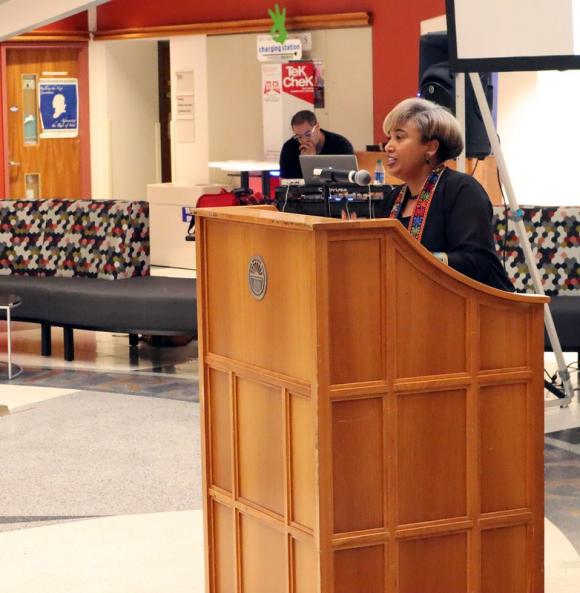
Justice Leona Theron speaks to students at the Minority Student Program Dream Party.
Justice Theron’s visit culminated with an address to students at the Minority Student Program (MSP) Dream Party in Newark as part of MSP’s orientation events. She remarked, “From the age of 16, I worked during every school and university holiday in order to pay for my university expenses. When I got to university, I had three part-time jobs. Over the weekends, I worked as a cashier with my mother. In the evenings, I worked at the law library at the university and during my free time in the day I would tutor other students. And I can tell you, I have not stopped working. I found that I always have to work twice as hard as my male counterparts, by reason of my youth, my gender, and my race.” She continued, “We will all have different experiences and obstacles, because of our identities. Yet, it is important to bear that identity and forge a path for yourself, so that others, like you, can follow in the path you leave.”
The visit is just one of several facets of the Rutgers Law School course, “South African Constitutional Law.” Students not only learn about the nation’s legal system and history, but they also gain first-hand knowledge of how the law can be used for social justice changes both here and internationally. A select group of law students have visited the Constitutional Court and heard from sitting Justices nearly every year in March as part of the course. In fact, Rutgers Law School has had a relationship with the Constitutional Court of South Africa for nearly two decades. Alumni are invited to sponsor and travel with the group to help offset the cost of student travel.
A rotating slate of Rutgers Law professors teach the course including Professor Christina S. Ho who organized the 2022 trip to Capetown, Johannesburg, and Kruger National Park during Spring Break. She says partnerships, like the one that brought Justice Theron to New Jersey, are important even for law students that don’t plan to enter the realm of international law. “Law practice is increasingly global and aspiring lawyers can benefit a lot from the development of both their comfort level and their skill level working with non-U.S. legal systems and non-U.S. clients,” she said. “The South African legal system, as a common law system, whose basic legal materials are available in English, is a wonderful place to begin developing those capacities.”
Rutgers Law Co-Dean Kimberly Mutcherson and Vice Dean Stacy Hawkins will teach the course in Spring 2023. “Our longstanding relationship with South Africa, and the Constitutional Court in particular, has given both our faculty and our students access to extraordinary experiential learning opportunities,” Dean Hawkins said. “My own study abroad trip to South Africa got cancelled in March of 2020 due to COVID, but I am very excited about making the trip this Spring.”
